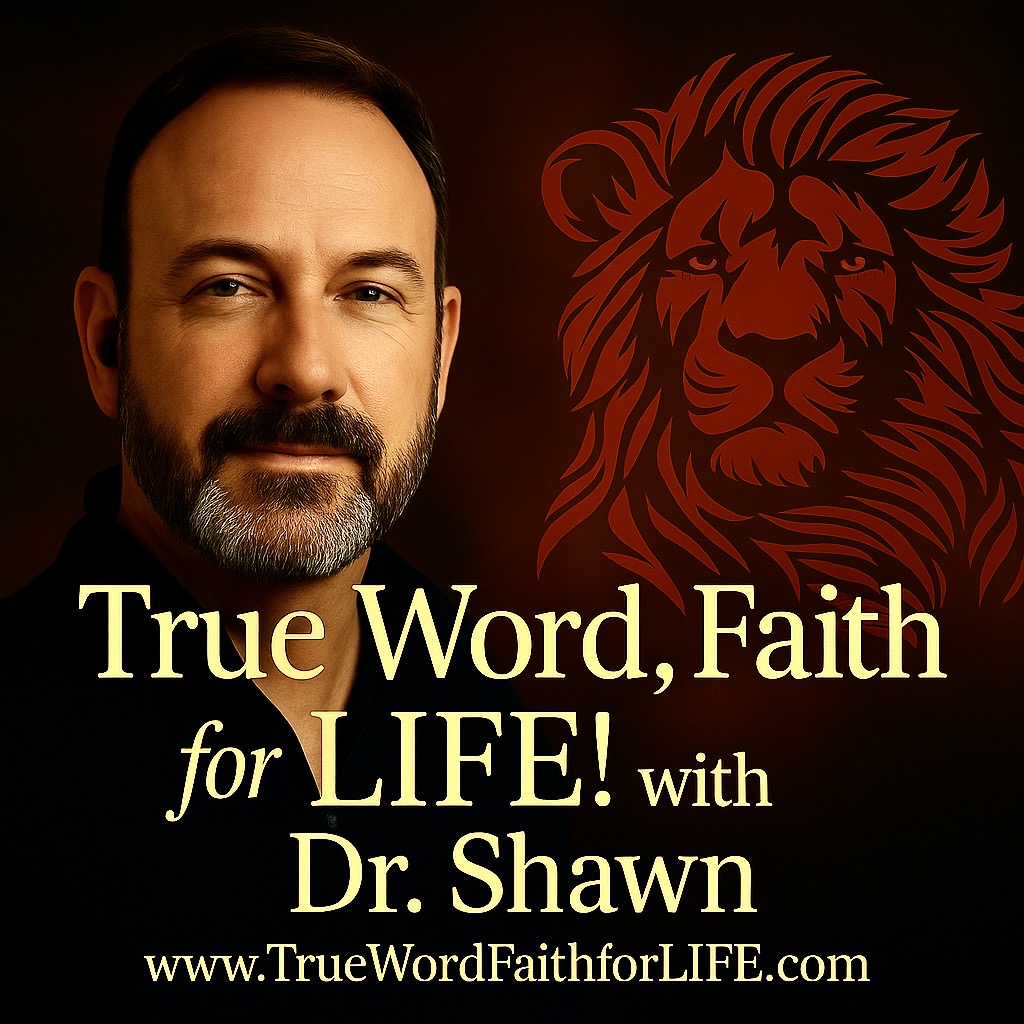What Does Romans 3 REALLY Teach About Sin and Grace?

All Have Fallen, God Remains Faithful
Series: Romans: Covenant, Faithfulness, and the Grafted-In Life
⸻
Discover the real meaning of Romans 3 with Dr. Shawn M. Greener, Follower of the Way and author of True Word, Faith for LIFE!
This episode unveils how “all have sinned” is not condemnation but covenant hope—revealing the unstoppable faithfulness of God through Messiah Yeshua.
What if “all have sinned” wasn’t condemnation but covenant hope?
Dr. Shawn M. Greener reveals how Romans 3 shows God’s unshakable faithfulness—where sin meets grace, and mercy triumphs through Messiah Yeshua. 6:30 PM EDT TONIGHT!
#Romans3 #FaithfulnessOfGod #TrueWordFaithForLife
https://www.youtube.com/live/7tWDy2H7Z0Q?si=G1kmrYxHuh0kgPrb
https://rumble.com/v70uzx2-what-if-all-have-sinned-wasnt-condemnation-but-covenant-hope.html
When Faith Fails, God’s Faithfulness Stands
What if righteousness is not about your goodness at all?
What if it has never been about what you can do for God, but about what He has already done for you?
Romans 3 is one of the most quoted and most misunderstood passages in the entire Bible. “All have sinned and fall short of the glory of God” is not a sentence of despair. It is a declaration of hope.
That verse does not close the door on humanity. It opens the door to divine mercy.
Because Romans 3 is not the end of the human story. It is the unveiling of God’s relentless faithfulness in the middle of our failure.
⸻
Faithfulness in the Face of Failure
Paul opens Romans 3 with a question: “What advantage has the Jew?”
His answer is clear: “Much in every way. To begin with, the Jews were entrusted with the oracles of God.”
Israel’s calling was not privilege. It was responsibility.
They were entrusted with the revelation of God’s character.
But then Paul asks, “What if some were unfaithful? Does their faithlessness nullify the faithfulness of God?”
And his response thunders through the centuries:
“By no means! Let God be true though everyone were a liar.”
God’s faithfulness is not a reaction to our faithfulness. It is His nature.
In Hebrew, emunah means “steadfast loyalty.” It is covenant faithfulness that does not falter when we do.
Even when Israel rebelled, even when we stumble, His covenant love—His hesed—remains.
As Dr. Michael Heiser wrote, “God is not surprised by human unfaithfulness; He has already built His faithfulness around it.”
Your failure does not cancel the covenant. It proves how strong it is.
⸻
The Universal Condition
Paul levels the playing field:
“All, both Jews and Greeks, are under sin.”
He quotes Psalms, Isaiah, and Ecclesiastes to show that the human heart, left to itself, cannot reach God’s standard.
None is righteous. No, not one.
That is not condemnation; it is clarity.
The problem is not that we are bad people needing improvement. It is that we are broken people needing redemption.
And that is where the good news begins.
⸻
Taco Tony and the Covenant of Grace
My friend Taco Tony put it perfectly while flipping carnitas at the grill one day.
“Doc,” he said, “are you telling me even if I keep my promises, pay my taxes, and buy my momma flowers on her birthday, I still fall short?”
“Yes, Tony,” I told him. “But not because you are bad. Because the standard is not comparison; it is covenant.”
Tony grinned and said, “So, it’s like when I try to make my abuela’s recipe. No matter how close I get, it still misses something… but she never stopped loving me for trying.”
Exactly.
God’s standard is perfection, but His love is covenant loyalty. You and I cannot reach His standard, but His Son already has.
⸻
The Purpose of the Torah
Romans 3:20 says, “By works of the Law no human being will be justified in His sight, since through the Law comes knowledge of sin.”
The Torah was never meant to be a ladder to climb up to God. It was meant to be a mirror to show us how much we need Him.
Dr. Skip Moen puts it simply: “Torah diagnoses the disease; Messiah provides the cure.”
The Law reveals what separates us from God, not to condemn us but to drive us to mercy.
Think of the Torah like an X-ray. It does not cause the fracture; it reveals it.
And once you see the break, you stop pretending you are fine and run to the Great Physician.
⸻
The Righteousness of God Revealed
“But now,” Paul writes, “the righteousness of God has been manifested apart from the Law… through faith in Yeshua the Messiah for all who believe.”
The righteousness of God—tzedakah Elohim—is not moral perfection. It is covenant faithfulness revealed through action.
When Paul says “apart from the Law,” he does not mean “against the Law.”
He means God’s faithfulness extends beyond the Law’s power to save. The Torah pointed toward Messiah, and now, through Yeshua, that faithfulness has become flesh.
We live in a world obsessed with moral performance.
Our culture believes that if you post the right things, signal the right virtues, or say the right words, you can justify yourself before the crowd.
But moral performance is not righteousness. Grace is.
And in God’s courtroom, your résumé does not matter. Your repentance does.
The Judge has stepped down from the bench to pay your sentence Himself.
⸻
Justified by Grace Through Redemption
“All have sinned and fall short of the glory of God, and are justified by His grace as a gift, through the redemption that is in Messiah Yeshua.”
The word dorean means “freely.”
The word apolutrōsis means “redemption,” a term for buying back a slave’s freedom.
Sin enslaves. Messiah redeems.
Paul then uses a term every priest in Israel would have recognized:
“God put forward Messiah as a hilastērion (ἱλαστήριον), or kaporet (כפרת), a mercy seat, by His blood.”
In the Holy of Holies, the kaporet was the cover of the Ark where blood was sprinkled to atone for Israel’s sin.
Paul declares that Yeshua is now the Mercy Seat itself—the meeting place of judgment and grace.
He is where heaven meets earth.
That is why we can say with confidence: all have fallen, but God remains faithful.
⸻
Pause and Reflect
Have you ever tried to earn God’s love by being good enough, only to realize He already gave it freely?
That moment changes everything.
When you see that His faithfulness never depended on your performance, you finally understand grace.
⸻
Challenge and a Choice
Romans 3 removes every reason for boasting.
All have sinned. All fall short. But God remains faithful.
The Challenge:
Where are you still trying to prove your worth before God instead of trusting His covenant grace?
The Choice:
Will you stand on your own record, or on Messiah’s righteousness?
You cannot earn what grace already gave. You can only receive it, walk in it, and reflect it.
⸻
Prayer of Salvation
Heavenly Father, I come to You today with an open and humble heart.
I know that I have sinned and fallen short of Your glory, and I ask for Your forgiveness.
Right now, I turn away from my sins and turn fully toward You.
I believe that Jesus, Your Son, is the promised Messiah, that He died for my sins, was buried, and rose again on the third day just as the Bible says.
Today I call on Your holy Name. Please forgive me, cleanse me, and make me new.
Fill me with Your Holy Spirit and write Your truth upon my heart.
From this day forward, I choose to follow Jesus as my Lord, my Redeemer, and my King.
Thank You for loving me, for saving me, and for making me part of Your family forever.
In the name of Jesus Christ, the King of Kings, I pray. Amen.
➡ If you prayed that prayer today, I want to welcome you into the family of God.
Contact me through TrueWordFaithforLife.com/contact, and I will personally help you walk forward in your faith.
⸻
Share This Message
Before you leave, I want to ask you for one simple favor.
If this message stirred your heart or helped you see the Bible more clearly, share it with someone today.
Think of one person who needs encouragement and truth. Send it to them right now. Be that friend who shares light in a dark world.
If you do not want to share, please email me at smgreener@gmail.com and let me know why. I would love to understand how I can better serve hearts hungry for truth.
⸻
Closing Reflection
Beloved, Romans 3 is not a chapter of condemnation.
It is the crescendo of covenant love.
The Judge has become the Redeemer.
The Law has found its fulfillment in grace.
The mercy seat has a Name, and His Name is Yeshua.
Live in humility.
Live in grace.
Live in covenant faithfulness.
Shalom b’Shem Yeshua.
This has been True Word, Faith for LIFE! with Dr. Shawn M. Greener.
For more teachings, visit TrueWordFaithforLife.com.
© 2025 Dr. Shawn M. Greener. All Rights Reserved.
True Word, Faith for LIFE!
Study Guide
STUDY GUIDE
Romans 3 — “All Have Fallen, God Remains Faithful”
Series: Romans: Covenant, Faithfulness, and the Grafted-In Life
Author: Dr. Shawn M. Greener, Follower of the Way
⸻
Summary
Romans 3 stands as one of Paul’s most profound expositions on both the human condition and divine covenant faithfulness. The Apostle dismantles any illusion of human superiority—Jew or Gentile—by establishing that all have sinned and fall short of the glory of God. Yet this is not a message of despair; it is the unveiling of God’s unwavering emunah (faithfulness).
Paul demonstrates that God’s righteousness (tzedakah Elohim) is not detached moral perfection, but His loyal fulfillment of covenant promises through Yeshua the Messiah. The Torah exposes humanity’s inability to attain righteousness apart from grace, while the Messiah embodies the mercy seat (hilastērion, kaporet) where justice and grace meet.
Romans 3 invites every believer to abandon self-justification and embrace covenant grace that redeems, restores, and reconciles.
⸻
Key Passage
“For all have sinned and fall short of the glory of God, and are justified freely by His grace through the redemption that is in Messiah Yeshua.”
— Romans 3:23–24
⸻
Outline
1. God’s Faithfulness Despite Human Failure (Romans 3:1–4)
Paul begins by asking, “What advantage has the Jew?” and immediately affirms that Israel’s advantage is being entrusted with the logia tou Theou (oracles of God). This stewardship carries covenant responsibility, not privilege.
When he asks, “What if some were unfaithful? Does their faithlessness nullify the faithfulness of God?” the emphatic response comes in Greek: mē genoito! (“May it never be!”).
Here Paul anchors divine justice in covenant character, not human behavior. God’s promises stand even when human partners fail. This echoes the Hebrew understanding of emunah—steadfast relational loyalty. God’s fidelity is not reactionary; it is rooted in His essence.
“By no means! Let God be true, though every man a liar.” (Romans 3:4)
God’s faithfulness is not canceled by our failure; it is revealed through it.
⸻
2. The Universal Condition of Sin (Romans 3:9–18)
Paul levels all distinctions by declaring that both Jews and Gentiles are “under sin.” The Greek phrase hyp’ hamartian conveys subjection, as though sin were a tyrant ruling humanity.
Quoting Psalms and Isaiah, Paul builds a litany of human depravity—none righteous, none understanding, none seeking God. This is not nihilistic despair but theological clarity.
Sin is universal; therefore, redemption must be universally available through the same covenant promise.
“None is righteous, no, not one… there is no fear of God before their eyes.” (Romans 3:10, 18)
This section removes all grounds for boasting, positioning every person in need of grace.
⸻
3. The Purpose of the Torah (Romans 3:19–20)
Paul’s assertion that “through the Law comes knowledge of sin” reveals the diagnostic function of Torah.
In Hebrew, yada means “to know by experience.” Thus, Torah does not simply define sin; it exposes it experientially. It is a mirror, not a ladder.
Dr. Skip Moen explains that Torah is “not about climbing up to God, but about understanding where we have fallen from.”¹ The Law reveals separation so that humanity may turn toward covenant restoration.
Like an X-ray, Torah reveals what is broken; it does not heal the break. Only the Great Physician—Yeshua—can perform that work.
⸻
4. The Righteousness of God Revealed Apart from the Law (Romans 3:21–22)
Paul transitions from diagnosis to deliverance. The righteousness of God (dikaiosunē theou) has now been manifested apart from the Law, though the Law and the Prophets testify to it.
This is not antinomian; it is covenantal fulfillment. God’s righteousness is His faithfulness in action. In Hebrew, tzedakah Elohim emphasizes covenant reliability.
Yeshua embodies that reliability. Through faith in Him, the covenant promise to Abraham is realized for Jew and Gentile alike.
Paul’s declaration confronts both ancient and modern attempts at self-righteousness. Whether through religious performance or moral activism, humanity seeks to justify itself before others. But divine justice is not achieved through human effort; it is received through grace.
⸻
5. Justified by Grace through Redemption (Romans 3:23–26)
“All have sinned and fall short of the glory of God.”
Here, kavod Elohim (the glory of God) refers to His manifest presence. Humanity’s fall is not only moral but relational—a fracture in covenant intimacy.
The word dorean (freely) affirms that justification is a gift, not a wage. Apolutrōsis (redemption) evokes the imagery of purchasing a slave’s freedom.
Paul then introduces the word hilastērion (ἱλαστήριον), the Greek translation of kaporet (כפרת), “mercy seat.” This term anchors Paul’s theology in Temple imagery: the place where blood reconciled Israel with God.
Yeshua becomes the hilastērion—the living mercy seat—where justice and mercy converge. His blood covers sin and restores fellowship.
Dr. Michael Heiser writes, “The cross is where the loyalty of God met the rebellion of man, and the loyalty won.”²
This is the heart of Romans 3: justification not as acquittal alone, but as covenant restoration.
⸻
Key Hebrew and Greek Terms
Term Language Meaning Application
Emunah (אֱמוּנָה) Hebrew Faithfulness, loyalty, covenant trust God’s fidelity does not depend on human faithfulness
Hesed (חֶסֶד) Hebrew Covenant love, steadfast kindness God’s love endures human failure
Tzedakah Elohim (צְדָקַת אֱלֹהִים) Hebrew Righteousness of God; divine justice Revealed as faithfulness in covenant fulfillment
Hilastērion (ἱλαστήριον) / Kaporet (כפרת) Greek/Hebrew Mercy seat, place of atonement Yeshua is the meeting place of justice and mercy
Apolutrōsis (ἀπολύτρωσις) Greek Redemption, to buy back Christ redeems humanity from slavery to sin
Dorean (δωρεάν) Greek Freely, without payment Grace is a divine gift, not earned merit
Discussion Questions
1. How does Paul’s argument in Romans 3 challenge both religious pride and moral relativism?
2. In what ways does understanding emunah and hesed transform how we view God’s righteousness?
3. Why is the Torah best understood as a mirror rather than a measuring stick?
4. What does it mean that Yeshua is the hilastērion (mercy seat) in your personal life?
5. How does recognizing God’s faithfulness in your own failures strengthen your obedience to Him?
⸻
Practical Application
1. Confession: Identify areas where you rely on self-effort for approval before God. Lay them down in prayer.
2. Reflection: Meditate on Romans 3:23–24 daily this week. Replace guilt with gratitude.
3. Action: Extend grace to someone who has failed you, just as God extends it to you.
4. Witness: Share one story of God’s faithfulness despite your weakness.
5. Transformation: Remember that holiness begins not with perfection, but with surrender.
⸻
Key Takeaway
God’s righteousness is not a standard for humanity to reach. It is His covenant faithfulness revealed to humanity through Messiah.
Our failures are not the end of the story—they are the stage upon which His faithfulness shines brightest.
⸻
Footnotes
1. Skip Moen, Hebrew Word Study: Revealing the Heart of God (Orlando: At God’s Table, 2014).
2. Michael S. Heiser, The Unseen Realm: Recovering the Supernatural Worldview of the Bible (Bellingham, WA: Lexham Press, 2015).
3. Complete Jewish Study Bible (Peabody, MA: Hendrickson Publishers, 2016).
4. Shawn M. Greener, True Word, Faith for LIFE! (Raleigh: Lulu Press, 2023).
⸻
Bibliography
• Greener, Shawn M. True Word, Faith for LIFE!. Raleigh: Lulu Press, 2023.
• Heiser, Michael S. The Unseen Realm: Recovering the Supernatural Worldview of the Bible. Bellingham, WA: Lexham Press, 2015.
• Moen, Skip. Hebrew Word Study: Revealing the Heart of God. Orlando: At God’s Table, 2014.
• Complete Jewish Study Bible. Peabody, MA: Hendrickson Publishers, 2016.
⸻
Shalom b’Shem Yeshua.
© 2025 Dr. Shawn M. Greener. All Rights Reserved.
True Word, Faith for LIFE!
Romans 3, Romans 3 explained, What does Romans 3 mean, All have sinned meaning, Romans 3 Bible study, Romans 3:23 explained, Covenant faithfulness, Faithfulness of God, Torah and grace, Messiah Yeshua, True Word Faith for LIFE, Dr Shawn Greener, Follower of the Way, Hebraic worldview, Messianic faith, Covenant theology
#Romans3 #FaithfulnessOfGod #GraceAndTruth #AllHaveSinned #TrueWordFaithForLife #DrShawnGreener #MessianicFaith #Yeshua #BibleTeaching #CovenantFaithfulness #Discipleship #HebraicRoots





